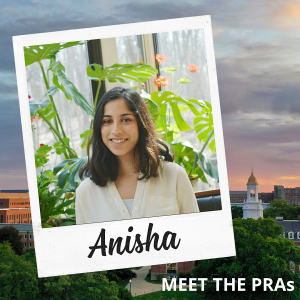Meet Anisha Jain ’21, an OUR Peer Research Ambassador (PRA) majoring in Pathobiology and minoring in Molecular & Cell Biology.
 What is the focus of your research?
What is the focus of your research?
Non-alcoholic fatty liver disease (NAFLD) and it’s more severe form non-alcoholic steatohepatitis (NASH), typically arise in individuals who are obese. In these cases, typically weight loss is the treatment option. In recent years physicians have discovered a large proportion of non-obese individuals who develop NASH. The pathogenesis and treatment of this distinct disease phenotype is not well understood. Since weight loss isn’t a viable option for non-obese individuals, my research aims to better understand the disease mechanism for NASH, as well as identify pharmaceutical and nutritional methods to mitigate steatosis and inflammation in mouse models of lean NASH.
Why did you get involved in research?
My dad is a physician in academia and his involvement in research has always been a large part of his identity, which he often shared our family. We would often travel to conferences both national and international to hear my dad and his colleagues present, as well as I’d frequently visit his office. Through all of this I was consistently surrounded by brilliant, awe-inspiring physicians and scientist who shaped my idea of research and academics. In the end I’m grateful to my dad and his brilliant colleagues who made research an exciting prospect and instilled the desire to be like them. In high school was accepted into a science research program in which I began to actually participate in this research I grew up hearing about. It was mentors in those few years, especially Dr. Karin Finberg, who deepened my curiosity and appreciation for research and eventually gave me the critical thinking and technical skills which enabled me to design an IDEA grant project.
What advice would you give to incoming freshmen?
There’s a dichotomy of undergraduate research: don’t feel rushed to get involved, but it’s there for you if you want it at any point in time. I am an example of getting involved in research very early in my life and academic career, which means that it’s there for anyone at any point, but it’s best to find ways to prime your curiosity. What I mean by that is listen to seminars, read papers, talk to professors, inside and outside of your academic major. Find things that excite you and that you’re passionate about, and keep an open mind.
What are your plans after graduation?
I hope to apply into M.D.-Ph.D. dual degree programs and study to become a physician-scientist. In short, my career will hopefully be completely research-centered.
Click here for more information on Anisha and other OUR Peer Research Ambassadors.